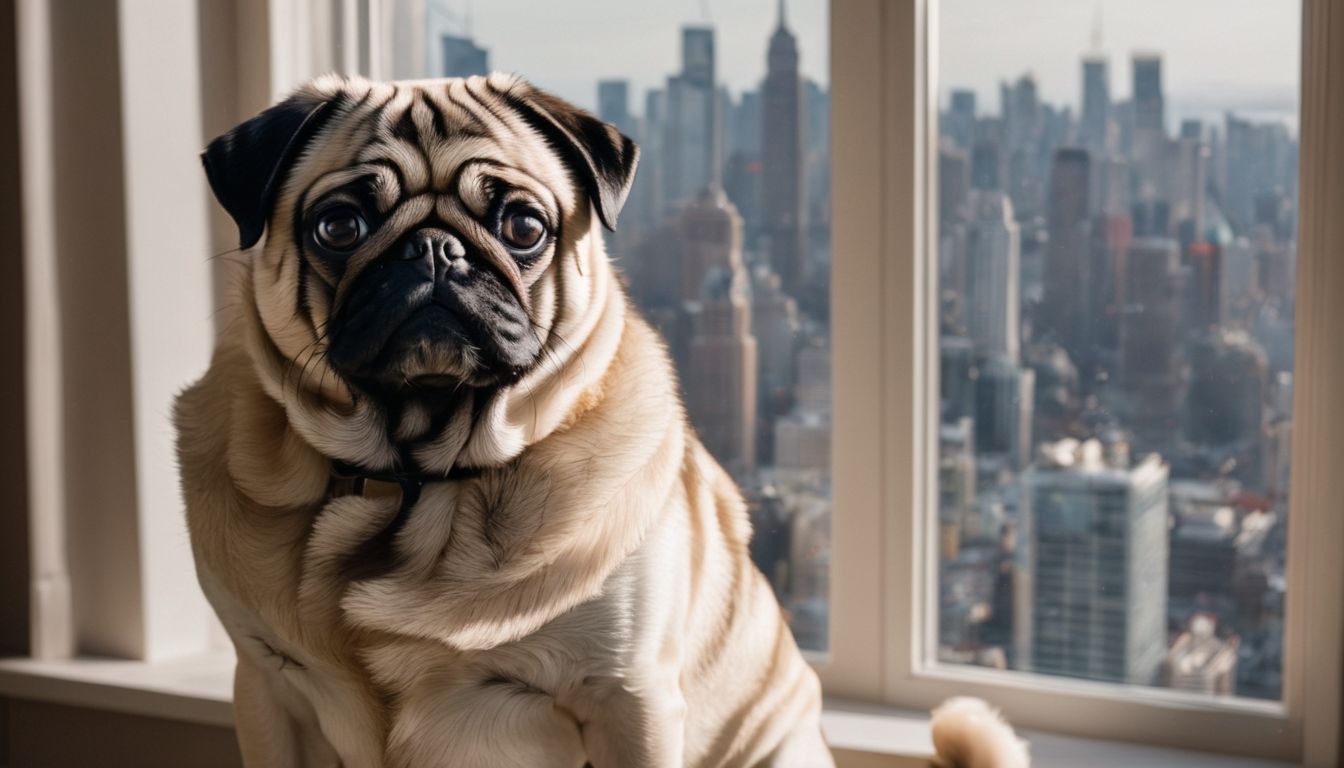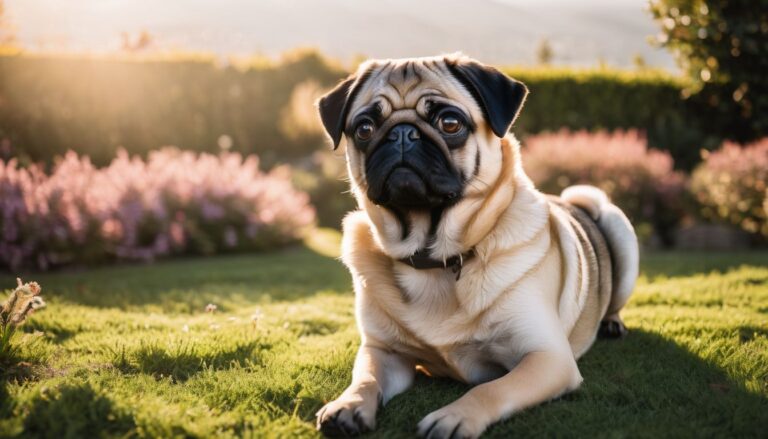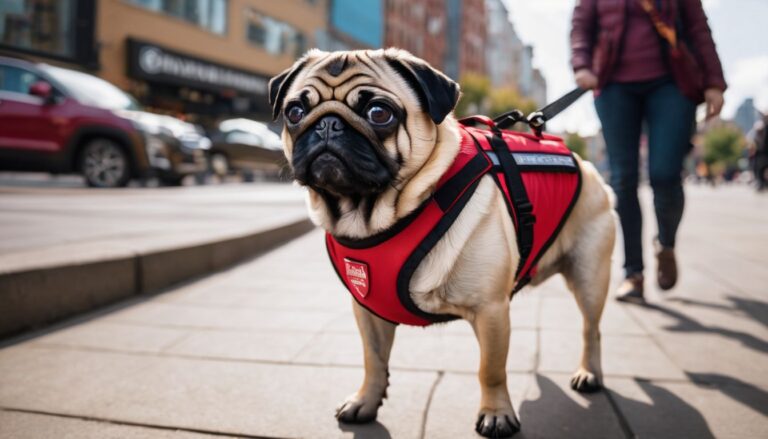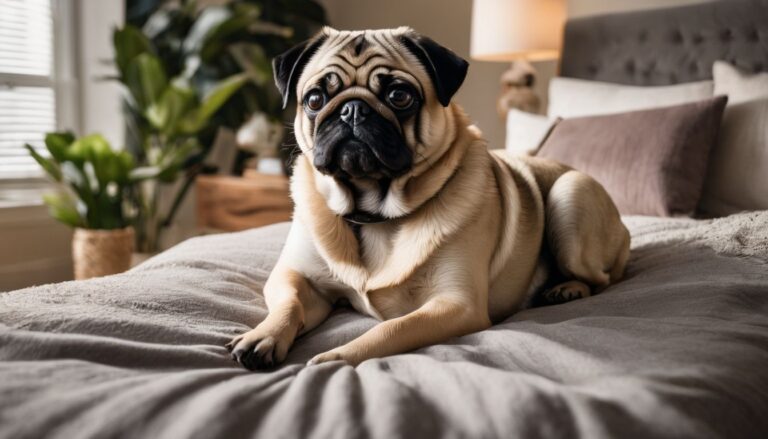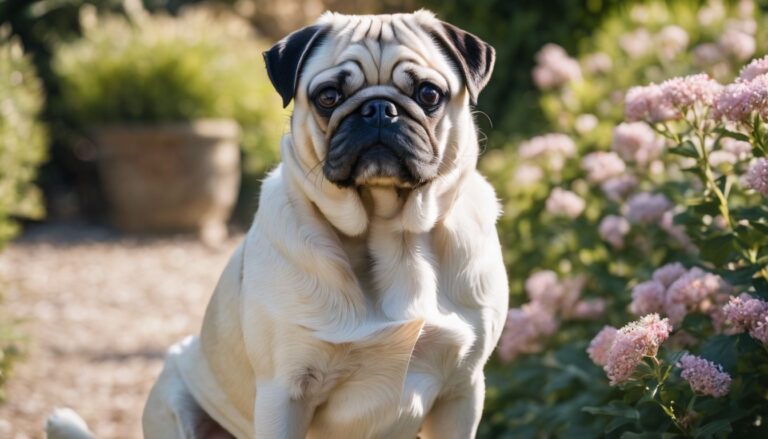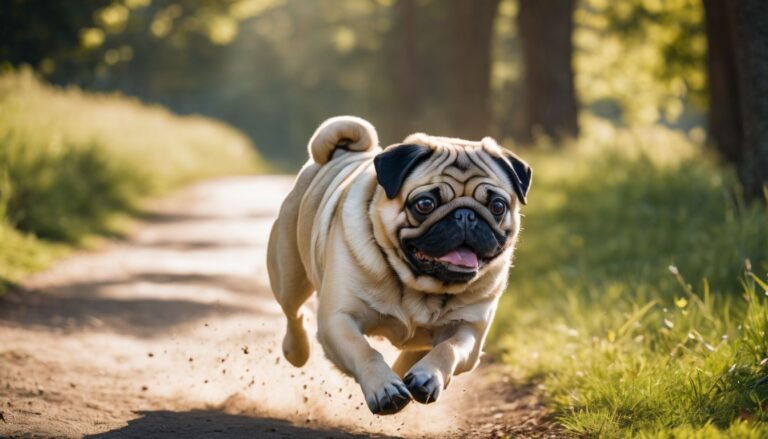Understanding Pug Temperament: Are Pugs Protective?
Are Pugs Protective?
Have you ever caught yourself gazing at your pug and thinking, “Could this little furball actually have a protective side?” Trust us, we’ve seen our own cuddly companions show off more than just those irresistible wrinkles and a smooshy face.
Believe it or not, size doesn’t always equal strength, and in the case of pugs, their hearts are definitely mightier than their frame. Our journey into the heartwarming world of these dogs has uncovered that beneath all that snuffling and playfulness lies a fierce loyalty that could surprise you with its intensity.
Stick around as we delve into the delightful spirit of these endearing canines—tiny sentinels who love nothing more than to keep watch over their beloved humans!
Key Takeaways
- Pugs have a protective side and can be surprisingly brave, often standing up to larger dogs when they sense their family is threatened.
- Despite their protective nature, pugs are not ideal guard dogs due to their small size; however, they excel as affectionate and loyal companions for families.
- These dogs require minimal grooming and exercise, making them low-maintenance pets that are well-suited for apartment living or homes with children.
- With an alert nature and strong loyalty towards their owners, pugs make vigilant watchdogs who will bark to raise the alarm if something seems amiss.
- Pugs’ charming personality comes from traits like their expressive wrinkled faces and quirky snoring sounds, which endear them to their human families.
The Unique Temperament of Pugs
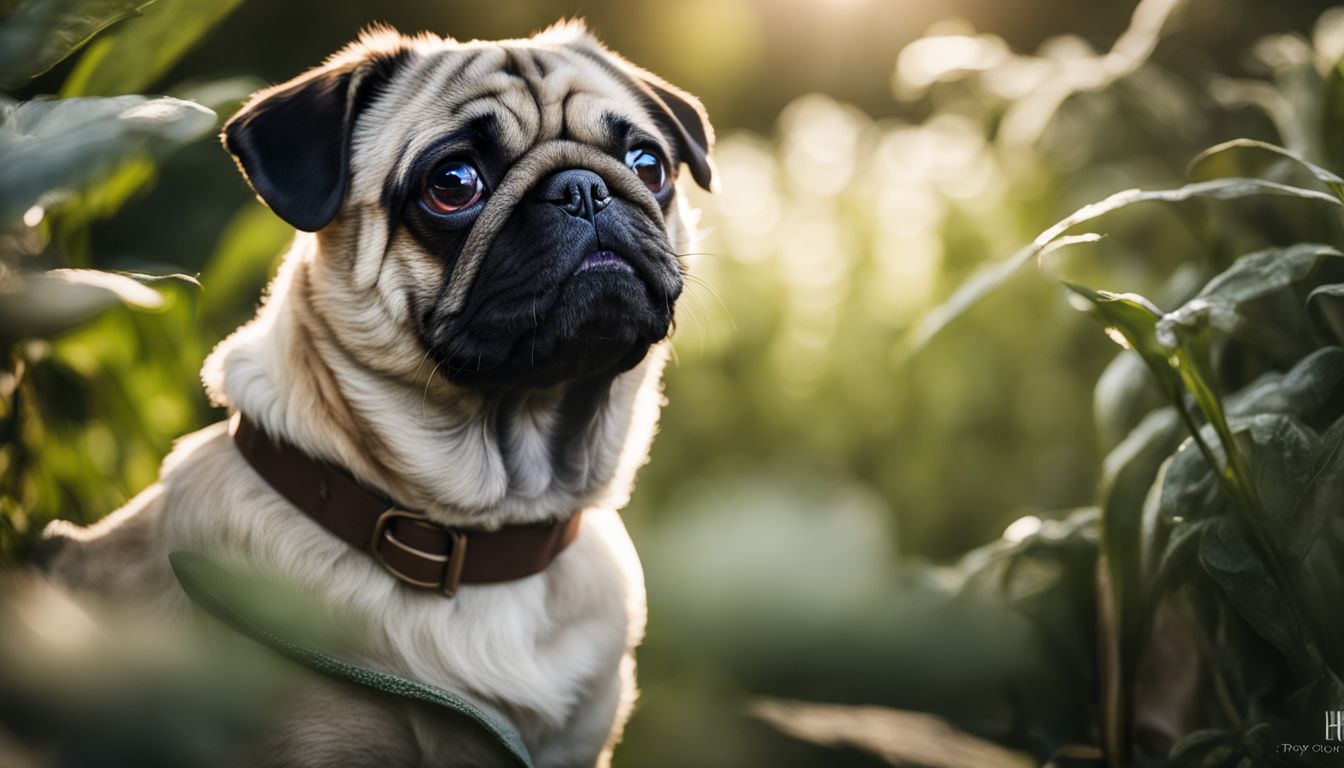
Pugs captivate us with their charming personalities. They were bred to be companions, and they excel at this role because of their affectionate nature. We often find ourselves amused by their quirky habits and expressive faces which reflect a range of emotions from happiness to deep concentration when sniffing out a treat.
Their temperament makes them ideal for families, as they adore children and are eager to play or cuddle.
Being protective is another trait we see in pugs; they can develop a strong sense of guardianship over what’s theirs. Despite not being traditional guard dogs or having an intimidating presence like Dobermans or German Shepherds, our little friends display courage when facing bigger challenges.
They might surprise you with their determination to stand ground and protect the home front – all done with that unique pug mix of tenacity and charm.
Physical Attributes of Pugs
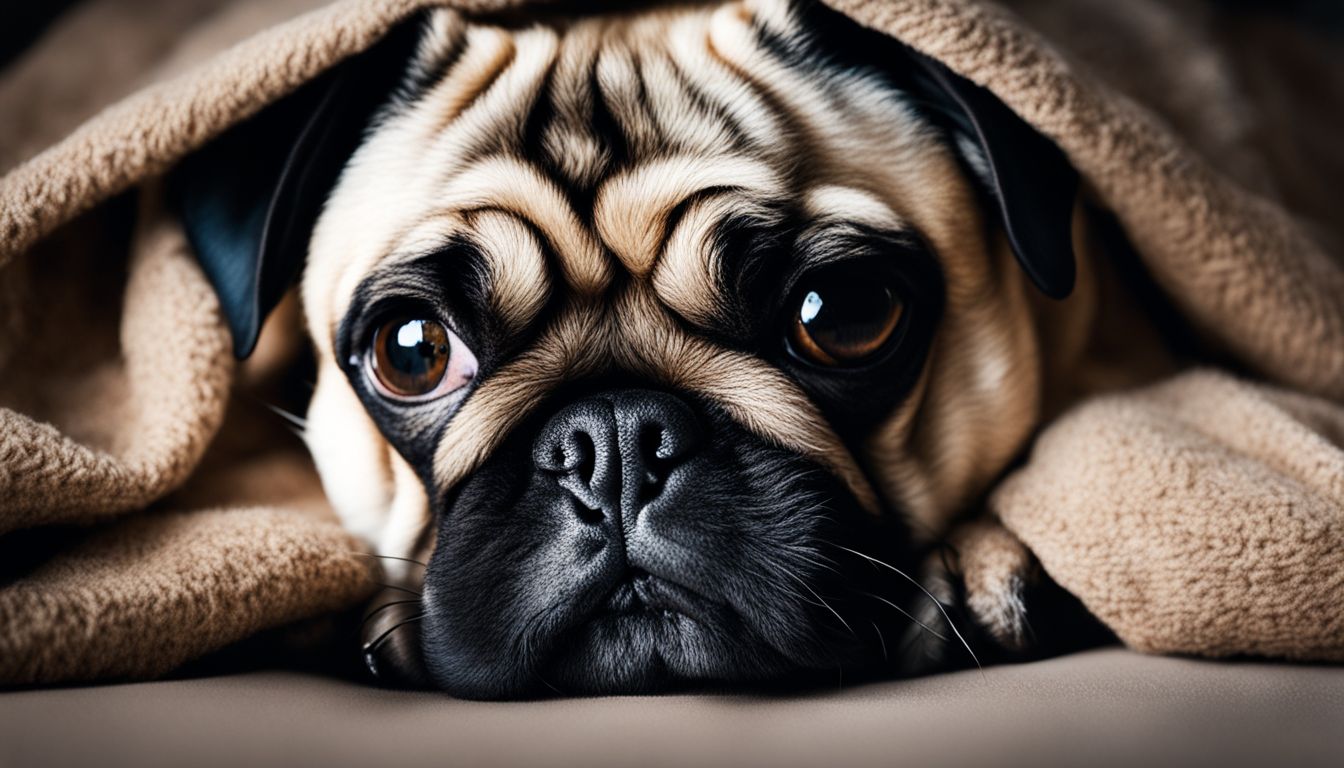
Pugs are known for their compact size, wrinkled faces, and distinctive snoring and snorting sounds. Their small stature makes them both adorable and easy to handle.
Compact size
Our pug’s compact size is part of their charm. These pint-sized pooches fit perfectly in our laps and make excellent apartment dwellers due to their small stature. Their tiny frames make them easy to carry and cuddle, which is a bonus for families who love a close companion that can join in on all activities without taking up much space.
We find their diminutive dimensions quite practical. Whether we’re traveling or simply moving around the house, our little buddies can easily come along with us. This makes them ideal pets for those of us living in smaller spaces or leading active lifestyles where larger breeds might not be as manageable.
Plus, when it comes to dog training and care, a compact breed like pugs requires less physical strength and can be easier for children or elderly family members to handle safely.
Wrinkled face
Pugs charm us with their deep facial wrinkles, which are not just adorable but historically prized. These distinctive folds require regular care to keep your pug healthy and happy.
We gently clean between the creases to prevent dirt and bacteria from causing irritation or infection—a simple yet crucial part of our companionship routine.
Their wrinkled face isn’t only a signature look—it’s also full of expression! Pugs convey curiosity, surprise, and delight all within the map of lines on their faces. As owners, we love watching these expressions change as they react to their environment or when we come home with new treats.
Their expressive faces make them one of the most endearing dog breeds and a joy to have in our lives.
Snoring and snorting
Pugs have a unique physical attribute that sets them apart: their distinctive snoring and snorting. This is due to their short muzzles and compact size, which can lead to breathing difficulties.
While it may sound concerning, this trait is simply a part of being a pug and is not necessarily indicative of health issues. Pug owners should be aware of this characteristic and keep an eye out for any excessive or abnormal respiratory sounds.
These adorable companions are known for their expressive faces, which include the endearing but noisy habit of snoring and snorting. It’s important for pug enthusiasts to understand that these sounds are normal for the breed due to their facial structure.
Protective Instincts of Pugs
Pugs are known for their alert nature and protective instincts, often showing loyalty and courage when it comes to guarding their family. To explore more about the protective nature of these lovable companions, keep reading!
Alert nature
Pugs possess an alert nature, making them attentive and vigilant. They are quick to respond to potential threats and will raise the alarm if they sense any danger. This trait makes them excellent companions for those seeking a loyal and watchful pet.
Their attentive instincts also make them highly responsive to their owners’ emotions and needs, forming strong bonds with their families.
Their keen awareness of their surroundings enables Pugs to be effective watchdogs, often letting out a bark or raising an alert if they perceive anything unusual. This characteristic complements their protective instincts and adds an extra layer of security to your home environment without compromising on their friendly disposition towards family members and visitors alike.
Protective towards their family
Pugs display protective instincts towards their family members, often showing a strong sense of loyalty and devotion. Their alert nature enables them to be vigilant guardians, keenly watching over their loved ones with curiosity and care.
Pugs can be quite determined when it comes to safeguarding their territory, demonstrating a natural inclination to protect what they consider theirs without needing any formal training or encouragement.
These traits make Pugs not just affectionate companions but also reliable guardians for the people they hold dear.
In addition, Pugs are known to stand their ground against larger dogs when protecting their family members or property. Their small size does not deter them from defending those they love, showcasing a bold and fearless attitude despite the odds.
Stand their ground against larger dogs
Pugs can show a remarkable display of bravery when confronted by larger dogs. Their protective instinct kicks in, and they do not back down easily. This behavior stems from their alert nature and their tendency to feel protective toward those they consider part of their family circle.
Pugs may be small, but they have the heart of a much larger dog, standing up for what they believe is theirs. While not bred specifically for guarding purposes, Pugs’ innate protective instincts make them fiercely loyal companions, ready to defend their loved ones when needed.
Limitations as Guard Dogs
Despite their protective nature, pugs are not well-suited for guard dog work due to their small size and friendly demeanor. Their affectionate and loyal disposition makes them more suitable as companion and family dogs rather than as deterrence-oriented guard dogs.
Small size and friendly nature
Pugs may be small in size, but their friendly and affectionate nature more than makes up for it. Their compact build and wrinkled face give them an irresistibly adorable appearance that appeals to dog lovers around the world.
They are known for snoring and snorting, which can be endearing to many. Despite their limitations as guard dogs due to their small stature, pugs are incredibly protective of their family members and what they consider theirs; this protective instinct is a testament to their loyalty and devotion.
Pugs’ curiosity, playful antics, and welcoming demeanor make them ideal companions for families with children. Pug owners find that these little dogs mesh well with other canine friends without aggression or territorial behavior.
Not suited for guard dog work
Pugs, due to their small size and friendly nature, are not well-suited for guard dog work. Their affectionate and sociable disposition makes them more inclined to be companion dogs rather than protectors.
While Pugs can exhibit protective instincts over what they consider theirs, their unique attributes such as compact size and amiable temperament make them less effective in traditional guard dog roles.
This breed’s history as a companion animal underscores why they may not excel in guarding duties, as they were originally bred for companionship rather than protection or hunting activities.
Pug as a Companion and Family Dog
Pugs are affectionate and loyal companions, making them ideal for families of all sizes. They are good with children and require minimal grooming and exercise, making them low-maintenance pets.
Affectionate and loyal
Pugs display an affectionate and loyal nature, forming strong bonds with their families. Their loving disposition makes them wonderful companions, always seeking opportunities to snuggle and be close to their loved ones.
Pugs are known for their unwavering devotion, often sticking closely by the side of their owners wherever they go.
Their friendly and dependable character ensures that they quickly become an integral part of the family unit. Pugs’ loyalty knows no bounds as they readily offer comfort and support to those around them in times of need.
Good with children
Pugs are affectionate and enjoy being around children, making them wonderful companions for families. They have a gentle temperament and are patient with kids, often forming strong bonds with them.
Their small size also makes them suitable for living in homes with limited space, allowing them to coexist harmoniously with energetic little ones. Pugs are known to be curious and playful, which can create enjoyable experiences for both children and the pet.
Their friendly nature and love for human interaction enable pugs to thrive in family settings.
Low maintenance
Pugs require minimal grooming, making them a low-maintenance breed. Their short coat only needs brushing once or twice a week to remove loose hair. Regular nail trimming and ear cleaning are essential for their health.
Due to their compact size, they are suitable for apartment living and do not need much outdoor space for exercise, making them an ideal choice for urban dwellers.
Their affectionate nature allows them to thrive on companionship, meaning they prefer being close to their family members rather than spending long periods alone. While regular veterinary check-ups are necessary, Pugs generally do not have extensive health requirements compared to some other breeds, with no specific dietary needs or rigorous exercise routines required.
Are Pugs Protective Conclusion
In summary, Pugs exhibit protective instincts over their family and belongings. Their alert nature and loyalty make them naturally inclined to stand their ground. Although not suited for guard dog work due to their small size, they excel as companions and family pets.
It’s important to understand that while Pugs may not be effective guard dogs, they are affectionate, loyal, and can display protective behaviors when it comes to what they hold dear.
Are Pugs Protective FAQs
1. Are Pugs Protective Dogs?
Pugs are not typically known as protective like Doberman Pinschers, but they do form strong bonds with their owners and can be alert to changes in their environment.
2. What is the right way to train a Pug to be well-behaved?
Success in training a Pug comes from consistency and positive reinforcement. Engage them in regular activity and reward good behavior to encourage obedience.
3. Can I leave my email address with the pet shop for updates on Pug care?
Yes, you can give your email address to the pet shop, so they can send you helpful information about caring for your new pug’s needs.
4. How should I view a Pug’s temperament when considering this breed for my family?
When choosing a pug, view them as friendly, sociable pets who thrive on human company rather than as guard dogs. They’re great companions that bring joy into any home.

